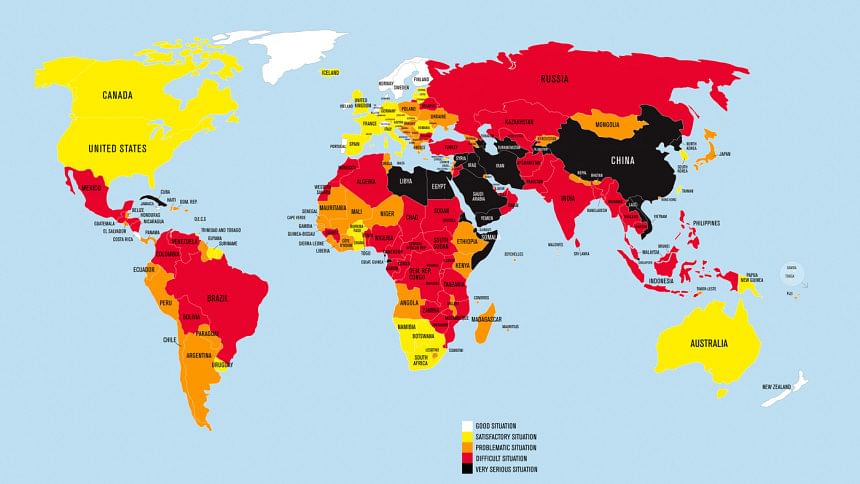World Press Freedom Index: Bangladesh goes from 151st to 152nd

Bangladesh has slipped down a notch in this year's World Press Freedom Index, which is prepared by Reporters Without Borders, also known as Reporters Sans Frontières (RSF).
This year, Bangladesh ranked 152nd out of 180 countries, while its position was 151st last year, according to the report released yesterday.
The index is calculated based on many indicators, but the one carrying more weight is "abuse", which measures the level of abuses and violence against journalists.
"The longer that journalists [professional and non-professional] are imprisoned, the more their imprisonment penalises the country concerned," the methodology section of the report states.
Bangladesh has the 27th highest "abuse score" in the world -- however India and Pakistan's abuse scores are higher by at least 10 points each.
Other factors that are taken into consideration include the degree to which opinions are represented in the media, media independence, environment of self-censorship, legislative framework, infrastructure and the transparency of the institutions and procedures that affect the production of news and information.
Countries are scored under these indicators based on a set of questions, which include queries that ask what political and religious factors prevent the creation of independent, privately owned media, whether the process for granting TV and radio licences is transparent, and whether the government can pressurise advertisers to favour certain media.
Other questions include whether the practice of journalism is discouraged based on gender, whether the media is language diverse, and whether it encourages recruitment of ethnic minorities.
"Does the government monitor or threaten journalists?" and "Do journalists practise self-censorship for the fear of civil lawsuits or criminal prosecution; threats to physical safety of the journalist or their family and friends, to their workplace or their home; professional reprisals or attacks on reputation?" are questions that are asked.
The index also evaluates whether journalists receive invitations to luxury events, press trips and other benefits of all kinds that would weaken their publications' objectivity.
Conflict of interest in media ownership is one of the many questions being asked. "What proportion of general-interest media is owned by companies with other interests in non-media sectors of the economy?" the organisation asked when evaluating a country.
"Translated into 20 languages, including English, Arabic, Chinese, Russian, Indonesian and Korean, the questionnaire is sent to journalists, media lawyers, researchers and other media specialists selected by RSF in the 180 countries and regions covered by the Index," stated the methodology section.
"Journalism is the best vaccine against disinformation," RSF secretary-general Christophe Deloire said.
"Unfortunately, its production and distribution are too often blocked by political, economic, technological and, sometimes, even cultural factors. In response to the virality of disinformation across borders, on digital platforms and via social media, journalism provides the most effective means of ensuring that public debate is based on a diverse range of established facts."
Norway topped the index for the fifth year in a row while Eritrea was placed in the bottom.
The World Press Freedom Index found that journalism was "totally blocked or seriously impeded" in 73 countries, while it was "constrained" in 59 others.
Many governments had used the pandemic to worsen repression, the report said.

 For all latest news, follow The Daily Star's Google News channel.
For all latest news, follow The Daily Star's Google News channel. 



Comments